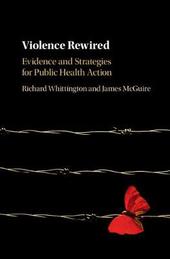
|
Violence Rewired: Evidence and Strategies for Public Health Action
Hardback
Main Details
| Title |
Violence Rewired: Evidence and Strategies for Public Health Action
|
| Authors and Contributors |
By (author) Richard Whittington
|
|
By (author) James McGuire
|
|
Foreword by Maria Fernanda Tourinho Peres
|
| Physical Properties |
| Format:Hardback | | Pages:316 | | Dimensions(mm): Height 235,Width 157 |
|
| ISBN/Barcode |
9781107018075
|
| Classifications | Dewey:303.6 |
|---|
| Audience | |
|---|
| Illustrations |
Worked examples or Exercises; 7 Tables, black and white; 3 Line drawings, black and white
|
|
Publishing Details |
| Publisher |
Cambridge University Press
|
| Imprint |
Cambridge University Press
|
| Publication Date |
2 April 2020 |
| Publication Country |
United Kingdom
|
Description
This thought-provoking book draws together research from genetics, anthropology, psychology and the social sciences to show that widespread assumptions about the inevitability of human violence are almost entirely a collection of myths. While violence has been a recurring feature of human life, there is no reason to suppose that it is inherent in 'human nature'. On the contrary, patterns of aggressive behaviour are largely learned through experience and even those individuals who have often acted violently can learn to change. Rejecting the speculations of much contemporary writing about human aggression, Violence Rewired presents an evidence-based alternative: a multi-level model of action to reduce violence at both individual and collective levels, linked to public health initiatives developed by the World Health Organization. If humanity is to survive the challenges it faces, a more realistic appraisal of ourselves and our basic tendencies is an indispensable part of the solution.
Author Biography
Richard Whittington is a professor at the Norwegian University of Science and Technology (NTNU) and is based at the Broset Centre for Research and Education in Forensic Psychiatry, St. Olav's University Hospital, Trondheim, Norway. He is a psychologist with a focus on violence prevention and mental health and is an Honorary Senior Research Fellow at the University of Liverpool. James McGuire is Emeritus Professor of Forensic Clinical Psychology at the University of Liverpool. He is also an expert witness in criminal courts and mental health tribunals, a consultant for criminal justice agencies in thirteen countries, and winner of the 2012 Research Prize from the International Corrections and Prisons Association.
Reviews'Violence Rewired is ground-breaking for its scope and rigour that takes us on a journey from our primate past to a potentially peaceful future. It dispels myths around our 'true nature' in a convincingly scientific and scholarly way that suits audiences ranging from nurses, judicial scholars, students to the scientifically curious.' Devon Polaschek, Joint Director of the New Zealand Institute for Security and Crime Science, University of Waikato, New Zealand 'This book offers one of the most sensible and useful accounts of human violence to date. In familiar and concise prose, Violence Rewired provides readers with a comprehensive overview drawing on archaeology, biology, and psychology. The authors enlighten with state-of-the-art scientific literature on the effectiveness of global efforts to reduce violent behavior.' Birgit Voellm, Medical Director of the Forensic-Psychiatric Hospital, University of Rostock, Germany 'The editors have conquered the complex challenge of comprehensively integrating biological, psychological, and social approaches to understanding violence. Their work presents a positive message: violent behaviour can be changed. This will be a big hit and eminent milestone for researchers in the field.' Tilman Steinert, Medical and Research Director of the Clinic for Psychiatry and Psychotherapy, Ulm University, Germany 'This outstanding book provides a comprehensive overview of theories and relevant research results on violence from various scientific disciplines. Moreover, it supplies optimism and greater confidence about possibilities of effectively intervening with violent people. In short, it is a must-read for those who want to gain the best possible grasp of (preventing) violence.' Vivienne de Vogel, University of Applied Sciences Utrecht, and Researcher, De Forensische Zorgspecialisten, The Netherlands 'It is a pleasure to welcome this book, which describes public health approaches to understanding and preventing violence. It includes wide-ranging reviews of biological, psychological and social factors, risk assessment instruments, and different types of interventions. This book will be of great interest to biologists, psychologists, social scientists, and anyone who is interested in understanding and preventing violence.' David P. Farrington, Emeritus Professor of Psychological Criminology, University of Cambridge
|